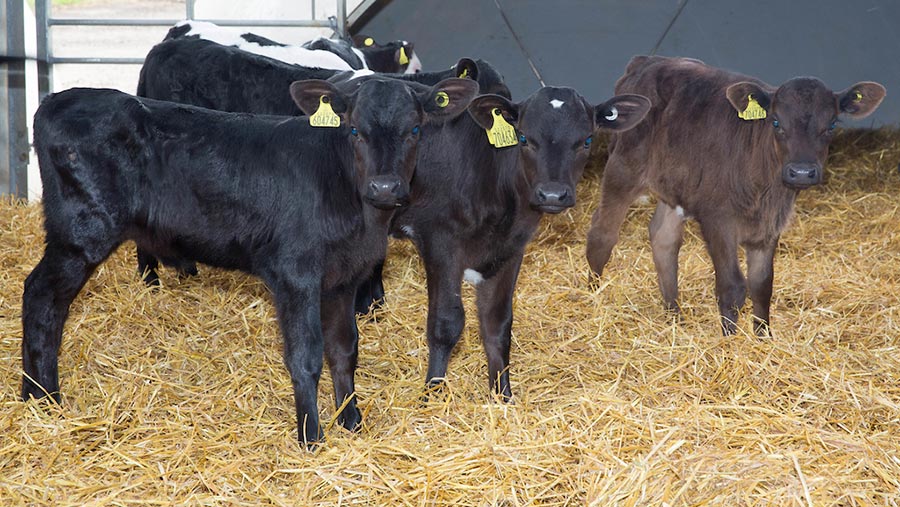£1m project aims to reduce disease and integrate dairy beef calf chain
 © Tim Scrivener
© Tim Scrivener A £1m project looking at the use of precision technology to detect early cases of disease in dairy beef calves and integrate data from different stages of their life is hoped to boost production.
Well-Calf will develop the first integrated monitoring system specifically designed for calves from seven days old to 16 weeks old for the early detection of important diseases such as scours and pneumonia.
This will allow for early intervention and optimise treatment and management practices at an individual animal level.
The overall aim is to:
- reduce disease incidence and spread
- reduce antibiotics use
- improve productivity
- optimise efficiency.
About 50% of beef production in the UK originates in the dairy herd.
There is large variation in productive weight-for-age and health status of young calves entering rearing units from dairy farms.
As a result, disease incidence and antibiotic use is high.
See also: How a high-welfare calf unit fine tunes health and nutrition
Projected industry losses due to suboptimal early-life management is £120m/year, while the impacts of disease cost the industry £80m/year.
About the project
The project will consist of the following components:
- A data collection system: integrating different sources of information from across the chain using novel and advanced sensing and farm records containing the required environment and animal information. The types of data recorded includes: birthweight, IgG (immunoglobulin) levels, daily liveweight gain (dlwg), weather conditions, temperature, humidity, wind speed and housing environment data, with dust and ammonia also measured internally.
- A data analysis platform: this will continuously analyse the data sources and provide the appropriate, real-time and automated health and performance flags to optimise intervention strategies.
- A decision support system: to optimise health and management protocols. This will be developed using expert advice from across the supply chain, including vet and animal science expertise.
Commenting on the project, vet partner Eamon Donnelly from Parkland Vet Group, who works with Dunbia’s rearing units, one of the Well-Calf partners, said: “The more you put in the more accurate our predictions [on calf health] will be.
“The hardware will pick up early signs of disease, therefore the calf will get prompt treatment and can be isolated, reducing chance of risk to other calves in a group.
“I know from everyday farm animal practice, early signs of calf pneumonia can often be missed.
“This allows infection to get established in individual calves.
“Once these more progressed signs of infection have been established, it is often too late.
“We know if we can treat and ‘nip infection in the bud’, there is a better outcome for the individual calf in terms of recovering from that infection and not impinging on future daily liveweight gain,” he added.
Mr Donnelly said if early-diseased calves were isolated quicker, it would also reduce the risk to other calves in the group.
He added: “As farms have got bigger and labour is a major issue, time spent on youngstock can be limited, which often leads to sick calves not being treated and isolated, which leads to higher mortality, lower daily liveweight gains and therefore [lower] future milk production.
“It also leads to higher use of antibiotics, which we all must work at to reduce.”
The project will be led by animal monitoring company Smartbell and the partners are Agri-EPI Centre, Co-op Group Food, Dunbia (England), Parklands Veterinary and Scotland’s Rural College.
